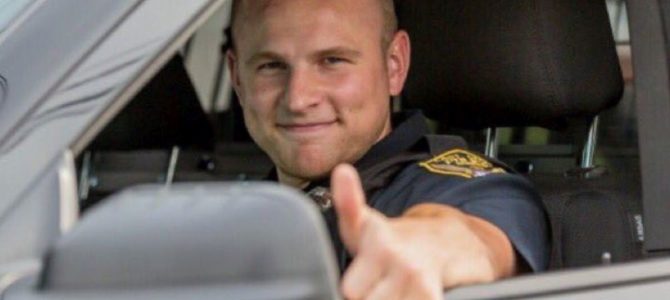On November 17, a police officer was killed during a routine traffic stop in New Kensington, Pennsylvania. His name was Brian Shaw, and he was only 25 years old.
According to reports, the suspect, 29-year-old Rahmael Sal Holt, fled his car after he was pulled over, and shot Shaw during the subsequent chase. Officials said Shaw did not appear to have fired his gun, while Holt fired at least six times, landing at least once in Shaw’s chest. Shaw lay in the street gasping for air before dying in a hospital that night. After several days on the lam, Holt was captured and arrested November 21 with Shaw’s handcuffs.
CAPTURED: Rahmael Holt was arrested in Hazelwood this morning and placed in Officer Shaw's handcuffs. #wtae pic.twitter.com/4kjxd6efWY
— Kelly Brennan (@kellybrennan412) November 21, 2017
No NFL players kneeled on Sunday to protest the brutality that occurred to Shaw. No national cable channels dedicated expansive coverage of the incident, if some even included it at all. It required a Google search to learn about the kind-hearted residents who lined the streets of the small Pennsylvania town holding American flags while firefighters stood in uniform paying their respects during the funeral procession.
This young man received an outpouring of love from his neighbors and community, but he deserved respect from all of us, too. So many times, we hear about Black Lives Matter and other protesters advocating for young men like Alton Sterling, who was shot and killed in Louisiana last summer, or Philando Castile, who suffered the same fate when a Minnesota police officer shot him in July. These were tragic events that understandably reverberated and divided communities by race—especially when the Caucasian officers in question were not charged and acquitted, respectively.
But the narrative that cops are always the “bad guys,” deserving condemnation and shame across the board, is simply not true. Some cops abuse their power. Others use it to do their duty. Like the five Dallas police officers killed in 2016, Shaw put on a uniform to serve and protect his community. Yet the NFL forbade the Cowboys from wearing special decals on their helmets to honor the fallen Dallas officers, while allowing its players to continue protesting law enforcement.
No superstar athlete has spoken out about Shaw’s murder, although he too was once a football player, at Slippery Rock University. Every Sunday, Shaw likely watched a sport he loved only to see a plethora of NFL players kneeling against men and women wearing the same uniform as him.
But that’s forgotten in an anti-police narrative en vogue among many. It’s no wonder there’s an absence of coverage over Shaw, when police fatality statistics across the country are hardly ever discussed—a shame, given the recent uptick.
A 2016 report from the National Law Enforcement Memorial Fund found a 56 percent increase in firearm-related deaths of police officers in the previous year. Sixty-four officers were killed in firearm-related incidents in 2016, compared to 41 the previous year. It was the highest tally of firearms-related deaths on record since 2011. So far in 2017, 115 police officers have fallen, and 41 of those deaths were caused by gunfire.
Are these statistics ever mentioned during the debate over America’s justice system? For every Colin Kaepernick GQ cover or celebrity rant on social media, there are officers like Shaw, who do not display an abuse of power in the discharge of their duties. So often during the NFL anthem protests, you hear players vow it has nothing to do with the U.S. military or police (although a lot of Americans are getting just that message). But it seems they have no problem disrespecting the officers who are paid to ensure players get from their cars to the stadium and back to the parking lot safe and sound. Our justice system isn’t perfect, and we should work to redress all injustices no matter their victims’ identities, but that shouldn’t detract from the many police officers who do their dangerous jobs well.
Men like Shaw risk their lives to do right by their community. Men and women leave their loved ones every morning, not sure if they might come back again. For that, we should take a little time to realize how worthy of respect many police officers are, and temper our complaints about isolated injustices with recognizing they don’t represent the norm, and that injustice the other way exists, too.









